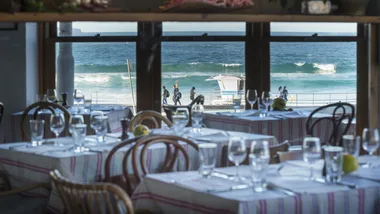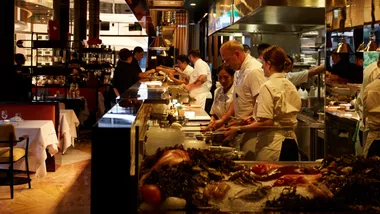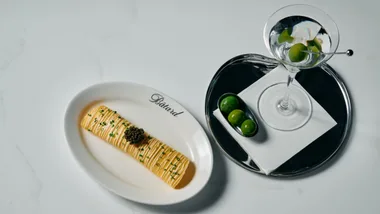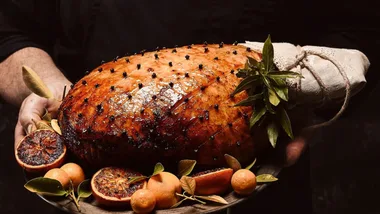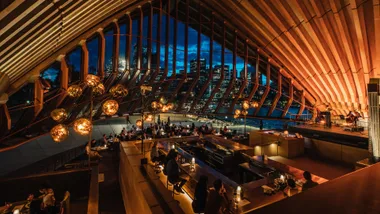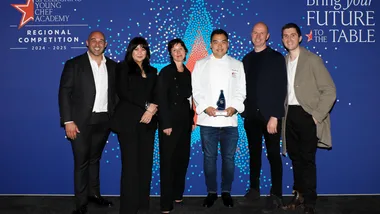Analiese Gregory has made a habit out of confounding expectations. When she returned to Sydney after stints in the élite kitchens of Bras in the Aubrac, and Mugaritz in San Sebastián, it wasn’t to a fine-diner, but to wine bar Bar Brosé, where toasted sandwiches and a whole deep-fried onion featured alongside giant gougères. Peter Gilmore, who mentored her as his 2IC for four and a half years at his acclaimed restaurant Quay, says Gregory is “the most serious and dedicated young chef” he’s ever come across. And yet just over a year after her head chef début in Sydney, she had left again, and Bar Brosé closed in her wake.
Gregory is no stranger to a sea-change. Born in Auckland to a Chinese-Dutch mother and a Welsh father, she moved around more than most while growing up. “For about two years we left home in New Zealand and drove around Australia in our caravan,” she says. “It makes you very adaptable, kind of like a chameleon.”
.jpg?resize=1024%2C877)
Analiese Gregory at Taroona Beach, south of Hobart.
In June, she moved again, to Tasmania to head the kitchen at Franklin. David Moyle, who opened the restaurant to acclaim in late 2014, was leaving to focus on his next project, the still-to-open Longsong in Melbourne. None of it was planned, says Gregory, but in March, after a phone call out of the blue from Franklin co-owner Ben Lindell asking her to consider the move, she felt the pull.
She’s running with it in Hobart. Aiden Jackson, “the fish guy”, comes to Franklin straight from the jetty: his boat filled with the likes of blue-throat wrasse, ocean perch and flathead caught less than an hour before. After jumping on the back of the boat and selecting the restaurant’s order, Gregory might roast the flathead whole, drizzled with a butter made with the fish’s roe, and scatter it with beach herbs. The ocean perch, meanwhile, she stuffs with lemon leaves, slathers with mussel butter and cooks on the bone. A local market gardener, Suzi Lam, is looking after Gregory’s shiitake mushroom forest, which she planted in firewood from Franklin on a whim.
.jpg?resize=877%2C1024)
Franklin’s bar
Aside from being a step closer to fulfilling her dream of having a garden, making wine and growing vegetables, she says the decision to pick up sticks came down to headspace. Her relocation comes at a time when many in the trade are questioning the effect gruelling hospitality hours can have on mental health, self-esteem and creativity. Chef Ben Shewry just announced he had reduced the working week to 48 hours for his staff at Attica, his Melbourne fine-diner. The new roster – four days on, three days off – is a bid to preserve balance and healthy dynamics between chefs and their partners, friends and families. Inspired by this move, Gregory has revised Franklin’s roster. Under Moyle, the restaurant was open five days for lunch, but Gregory has scaled it back to just two. “We were doing crazy hours and it wasn’t really sustainable,” she says. “We couldn’t continue like that. And I want to continue. I want to be happy.”
Gregory lives 40 minutes south of Hobart between Woodbridge and Birchs Bay. Country life suits her. The house, owned by the Lindells, is surrounded by vineyards and has a garden that Gregory has planted with horseradish and celeriac, okra, lovage and sweet cicely.
“It’s ridiculously beautiful and the air is super-fresh,” she says. “You wake up and you can see the ocean and the beds from where our oysters for the restaurant come from.” The drive back home after service, on the other hand, is not as easy. After finishing around midnight, she’s had plenty of near misses with rabbits, wallabies and even a duck. It’s a far cry from the city lights and Coca-Cola sign of Kings Cross, her home on and off for eight years.
.jpg?resize=877%2C1024)
Analiese Gregory picks produce fresh on the way to work.
Bar Brosé, which closed in September, was open just 18 months. “I feel really sad about it,” says Gregory. “Maybe I should have stayed, but then being in Sydney wasn’t what I wanted long-term and you have to look after yourself.”
During her time at Brosé, Gregory cooked food that was part-French, part-Chinese and a whole lot of wine-bar fun. There was a lot to love about her late-night sandwiches and giant Comté gougères, and the restaurant had potential: a rising star chef, great wine, the Luchetti Krelle design. But towards the end, Gregory seemed unsettled and the menu more static and less seasonal than what was perhaps intended (food in line with New York’s Wildair, and Clamato and Septime’s wine cave in Paris).
“I was never someone who wanted to be a head chef or have their own place; I just wanted to learn and work for other people,” she says. “But I’m more comfortable now and it feels more natural than it used to.”
Apart from Peter Gilmore, Michel Bras, of restaurant Bras in France’s southern Massif Central, has had the most influence on Gregory. She first read about the three Michelin-starred chef after moving to London when she was 18, and the restaurant instantly became her holy grail of cooking. “I was really intrigued by the whole thing,” she says, recalling a cookbook that ran recipes next to photographs of light and shadows, the Aubrac and Laguiole mountains. “Back in New Zealand at that time, cooking was very much a trade. Poring over the pages of that book was the first time I saw cooking as an art.” For years after, in between stints at The Ledbury in London and Le Meurice in Paris, Gregory dreamt about the restaurant. She wrote letters to Bras asking for a place in his kitchen, and six years later, in 2012, she was invited to come and work for a season.
Gregory’s experiences in France still serve as her yardstick for how to survive – and thrive – in a difficult field. Mornings in the Aubrac were spent in the Bras family garden picking grapefruit marigold, daylilies, sansho and radishes for the restaurant. This would be followed by coffee and pastries at an old wooden table with Bras’ 100-year-old whisks hanging above their heads and a fire going. “None of it’s for Instagram or for show,” says Gregory. “These people made the restaurant the centre of their family. And found a way to make it sustainable.”
.jpg?resize=877%2C1024)
Cheese-making, a new-found interest for Analiese Gregory.
It’s an attractive prospect, and one Gregory is edging closer to in Tasmania. On her drive into Franklin each morning, she pulls over to pick oxalis and wildrocket flowers and to meet one-on-one with a number of small producers who don’t deliver. Throughout the day other suppliers drop off unwaxed citrus for preserving, and the likes of purple sprouting broccoli and romanesco cauliflowers, which Gregory roasts whole in Franklin’s Scotch oven.
Being in a smaller city and closer to such great produce, she says, has put her more at ease in the kitchen. She folds Bruny Island sea urchin and wild fennel through linguine, dices raw Highland beef to go with salt-baked celeriac and toasted buckwheat, and teams housemade burrata curd with Jerusalem artichoke that she’s fermented and fried. Only one dish from Brosé has travelled south: an homage to Bras in the form of a gaufrette potato dessert with brown-butter mousse and salted caramel. “What I’m doing now is more natural and ingredient driven,” says Gregory. “And the woodfired oven is the linchpin of the kitchen.”
Another new and all-consuming passion for her is cheese-making. After a brief tutorial with local cheesemaker Bruce Kemp of Flowerpot Cheese, Gregory is hooked. Every Monday when the restaurant is closed, she hosts a private cheese club with an entry fee paid in wine or bread. So far there’s been a blue cheese with wild mould harvested from Franklin’s wine cellar, the same method they follow in Roquefort. It’s called Forbes d’Ambert after Franklin sommelier Forbes Appleby, and is made using kefir instead of commercial cultures. “This is how making cheese started,” she says. “People didn’t have freeze-dried cultures. It occurred from natural things growing around them.”
Even with numerous projects on the go, Gregory still makes time each Sunday to be by herself. It might mean driving to a fish and chip shop “in the middle of nowhere”, or taking herself hiking until she’s “calm and normal” enough to return home. “Being a restaurant chef is a love-hate thing,” she says.
There’s nowhere for her to hide at Franklin. The kitchen pass seats 10, and if you’re dining at the counter, chances are you’ll be asking questions. But Gregory isn’t bothered. “I’m focusing on enjoying cooking and doing what I said I’d always do, if and when I have time.” And that time, she says, is now.

